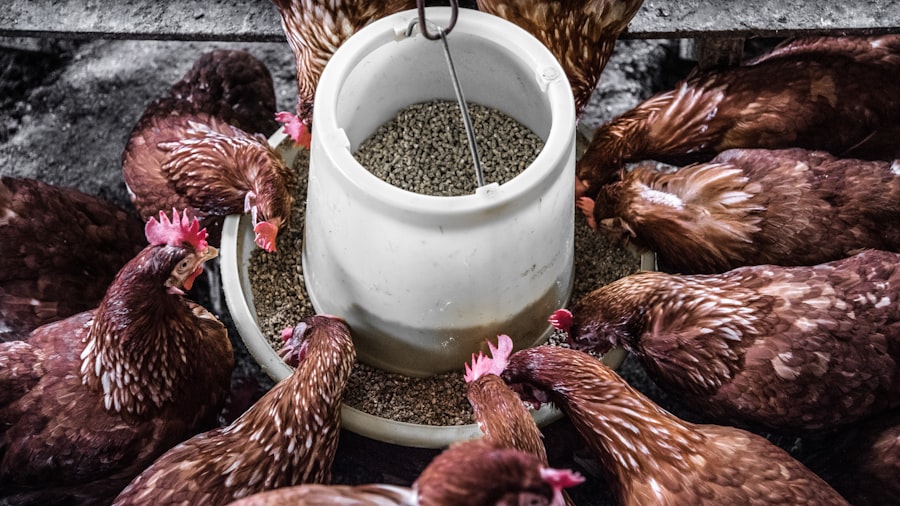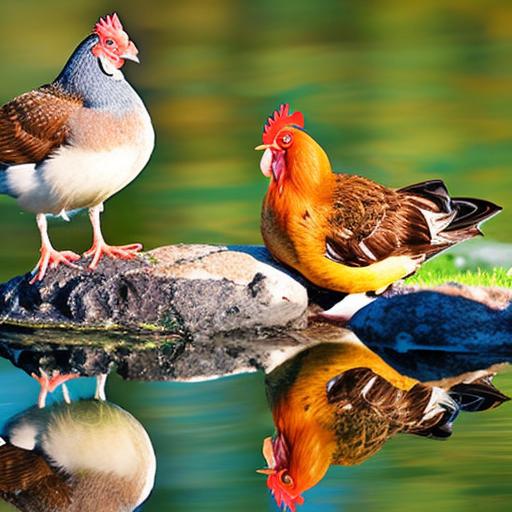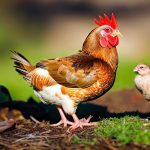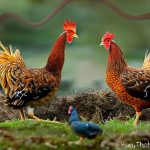Keeping chickens in a lake community can be a rewarding and sustainable way of life. Not only do you get to enjoy fresh eggs every day, but you also contribute to a more environmentally friendly lifestyle. In this article, we will explore the rules and regulations of keeping chickens in a lake community, the benefits of doing so, how to choose the right chicken coop, factors to consider when building a chicken coop, proper maintenance, feeding and caring for chickens, addressing concerns from neighbors, and ensuring the health and safety of your chickens.
Key Takeaways
- Understanding lake community rules and regulations is crucial before keeping chickens in a lake community.
- Keeping chickens in a lake community can provide benefits such as fresh eggs and natural pest control.
- Choosing the right chicken coop for a lake community involves considering factors such as size, materials, and design.
- Proper maintenance of a chicken coop in a lake community includes regular cleaning and predator-proofing.
- Ensuring the health and safety of chickens in a lake community involves providing proper nutrition, water, and medical care.
Understanding Lake Community Rules and Regulations
Before embarking on the journey of keeping chickens in a lake community, it is crucial to understand and abide by the rules and regulations set by the community. These rules are put in place to ensure the harmony and well-being of all residents. Common rules related to keeping chickens may include restrictions on the number of chickens allowed, noise regulations, coop placement guidelines, and waste management protocols.
By familiarizing yourself with these rules, you can avoid any potential conflicts with your neighbors and ensure that you are following the guidelines set by your lake community. It is also important to note that these rules may vary from one community to another, so it is essential to consult your community’s governing body or homeowner’s association for specific regulations.
Benefits of Keeping Chickens in a Lake Community
Keeping chickens in a lake community offers numerous benefits. One of the most obvious advantages is having a constant supply of fresh eggs. There is nothing quite like collecting eggs from your own backyard and knowing exactly where they came from. Fresh eggs are not only delicious but also packed with nutrients that are beneficial for your health.
Another benefit of keeping chickens in a lake community is natural pest control. Chickens love to forage and eat insects, slugs, and other pests that may be present in your garden or yard. By allowing your chickens to roam freely within a designated area, you can reduce the need for harmful pesticides and create a more balanced ecosystem.
Furthermore, raising chickens in a sustainable way can have positive environmental impacts. Chickens produce manure, which can be used as a natural fertilizer for your garden. By composting the manure and using it to enrich your soil, you reduce the need for synthetic fertilizers, which can be harmful to the environment. Additionally, chickens can help reduce food waste by consuming kitchen scraps and leftovers.
Choosing the Right Chicken Coop for a Lake Community
Choosing the right chicken coop is essential when keeping chickens in a lake community. The coop should provide a safe and comfortable environment for your chickens while also adhering to any regulations set by your community. When selecting a chicken coop, consider factors such as size, design, and materials.
The size of the chicken coop should be appropriate for the number of chickens you plan to keep. It should provide enough space for them to move around freely and engage in natural behaviors such as scratching and dust bathing. The design of the coop should also allow for proper ventilation and natural light.
In terms of materials, opt for sturdy and durable materials that can withstand the elements. The coop should be predator-proof to protect your chickens from potential threats such as raccoons or foxes. Additionally, consider the aesthetics of the coop and how it will blend in with the surrounding environment of your lake community.
Factors to Consider When Building a Chicken Coop in a Lake Community
If you decide to build your own chicken coop in a lake community, there are several factors to consider. First and foremost, check with your community’s regulations regarding coop construction. Some communities may require specific setbacks or guidelines for coop placement.
When choosing a location for your chicken coop, consider factors such as sunlight exposure, accessibility, and proximity to neighbors’ properties. The coop should receive adequate sunlight throughout the day to ensure the health and well-being of your chickens. It should also be easily accessible for cleaning, feeding, and egg collection.
When it comes to materials, opt for non-toxic and environmentally friendly options. Avoid using pressure-treated wood or other materials that may leach harmful chemicals into the soil. Consider using natural and sustainable materials such as reclaimed wood or bamboo.
Proper Maintenance of a Chicken Coop in a Lake Community

Proper maintenance of your chicken coop is crucial for the health and well-being of your chickens. Regular cleaning and inspection are necessary to prevent the buildup of waste and the spread of diseases. Remove any soiled bedding, droppings, or uneaten food on a regular basis.
Inspect the coop for any signs of damage or wear and tear. Repair or replace any broken or damaged parts to ensure the structural integrity of the coop. Regularly check for signs of pests such as mites or lice and take appropriate measures to control them if necessary.
Additionally, provide fresh water daily and ensure that your chickens have access to a balanced diet. Supplement their diet with appropriate feed and offer treats such as fruits, vegetables, or kitchen scraps in moderation. Regularly check for any signs of illness or abnormal behavior in your chickens and consult a veterinarian if needed.
Feeding and Caring for Chickens in a Lake Community
Feeding and caring for your chickens in a lake community is relatively straightforward. Chickens require a balanced diet consisting of grains, protein, vitamins, and minerals. Commercial chicken feed is readily available and provides all the necessary nutrients for your chickens.
In addition to commercial feed, you can supplement their diet with kitchen scraps such as vegetable peels, fruit scraps, or leftover grains. However, it is important to avoid feeding them anything toxic or harmful, such as chocolate, onions, or avocado.
Fresh water is essential for your chickens’ health and well-being. Ensure that they have access to clean and fresh water at all times. Consider using a waterer that prevents spillage and contamination.
Addressing Concerns from Neighbors in a Lake Community
Living in a lake community means being considerate of your neighbors. If any concerns arise regarding your chickens, it is important to address them in a respectful and proactive manner. Communication is key in resolving any issues that may arise.
If your neighbors express concerns about noise, consider implementing measures to minimize noise levels, such as providing soundproofing for the coop or limiting the number of roosters. If odor becomes an issue, ensure that the coop is properly cleaned and ventilated to minimize any unpleasant smells.
Being a good neighbor also means being open to feedback and willing to make adjustments if necessary. By addressing concerns promptly and finding solutions that work for everyone, you can maintain a harmonious relationship with your neighbors.
Ensuring Health and Safety of Chickens in a Lake Community
Ensuring the health and safety of your chickens is of utmost importance. Regularly monitor your chickens for any signs of illness or distress. Common health issues in chickens include respiratory infections, parasites, and nutritional deficiencies.
Preventive measures such as regular cleaning, proper nutrition, and vaccination can help minimize the risk of diseases. Consult a veterinarian who specializes in poultry health for guidance on vaccination schedules and preventive care.
Provide your chickens with a safe and secure environment by ensuring that the coop is predator-proof. Regularly inspect the coop for any signs of damage or potential entry points for predators. Consider installing fencing or other barriers to further protect your chickens.
Enjoying Fresh Eggs and a Sustainable Lifestyle in a Lake Community
Keeping chickens in a lake community can be a rewarding experience that allows you to enjoy fresh eggs while living a sustainable lifestyle. By understanding and abiding by the rules and regulations set by your community, choosing the right chicken coop, and properly maintaining it, you can create a safe and comfortable environment for your chickens.
Feeding and caring for your chickens, addressing concerns from neighbors, and ensuring their health and safety are all essential aspects of keeping chickens in a lake community. By following these guidelines, you can enjoy the benefits of fresh eggs and contribute to a more sustainable way of life in your lake community.
If you’re wondering whether you can keep chickens in a lake community, you might find this article on chicken coop regulations in Muskegon quite helpful. It provides valuable information on the guidelines and requirements for keeping chickens in this specific area. Whether you’re a beginner or an experienced chicken keeper, understanding the local regulations is essential to ensure a smooth and legal experience. Check out the article here for more details.
FAQs
Can I keep chickens in a lake community?
Yes, it depends on the specific rules and regulations of the lake community. Some communities may allow chickens, while others may prohibit them.
What are the benefits of keeping chickens in a lake community?
Keeping chickens can provide a source of fresh eggs, natural pest control, and fertilizer for gardens. They can also be enjoyable pets and provide a sense of self-sufficiency.
What are the potential drawbacks of keeping chickens in a lake community?
Chickens can be noisy and may disturb neighbors, especially if they are not properly cared for. They can also attract predators such as raccoons and foxes, which can be a nuisance or danger to other pets in the community.
What are some important considerations before keeping chickens in a lake community?
It is important to check the rules and regulations of the community before keeping chickens. It is also important to provide proper care and housing for the chickens, including adequate space, food, and water. Additionally, it is important to consider the potential impact on neighbors and take steps to minimize any disturbances.
What are some tips for keeping chickens in a lake community?
Some tips for keeping chickens in a lake community include providing proper housing and care, keeping the chickens contained to prevent them from wandering into neighbors’ yards, and being considerate of neighbors by minimizing noise and odors. It is also important to be aware of any local laws or regulations regarding keeping chickens.
Meet Walter, the feathered-friend fanatic of Florida! Nestled in the sunshine state, Walter struts through life with his feathered companions, clucking his way to happiness. With a coop that’s fancier than a five-star hotel, he’s the Don Juan of the chicken world. When he’s not teaching his hens to do the cha-cha, you’ll find him in a heated debate with his prized rooster, Sir Clucks-a-Lot. Walter’s poultry passion is no yolk; he’s the sunny-side-up guy you never knew you needed in your flock of friends!







